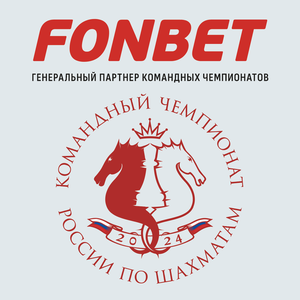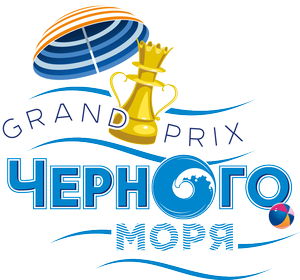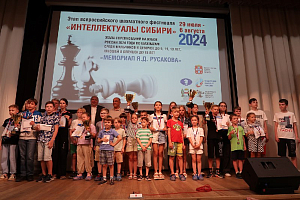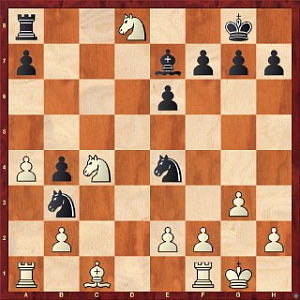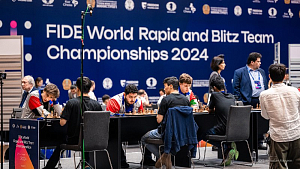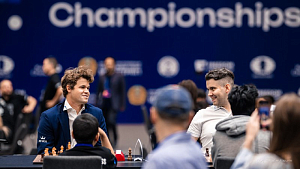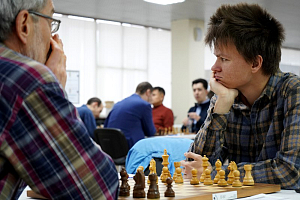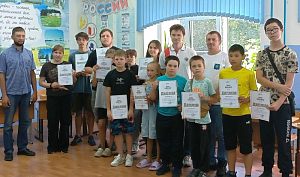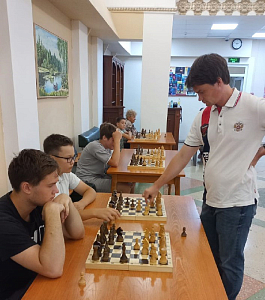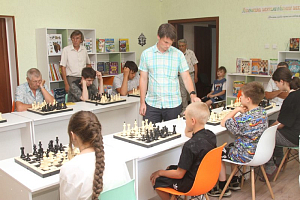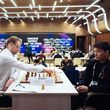Going Beyond the Boundaries of Chess Board
Dmitry Kryakvin reports about round one of the Russian Grand Prix final
The capital of Yugra has seen replacement of a rapid event with a classical one, but certain chess stage heroes have flown from one into another. It is true, though, that withstanding the Khanty-Mansiysk marathon (the Governor's Cup, the Rapid Governor's Cup, the Rapid Grand Prix final and the classical final) proved too much for not a few. Falling out of the race has been even such an old hand as a filibuster and samurai Pavel Ponkratov, followed by Maxim Chigaev, Dmitry Frolyanov, Vadim Moiseenko, and Alexandra Maltsevskaya. Despite an incredibly cordial welcome, it is still as long as a month that you have to be part of a freezing-cold environment... The newcomers have dealt merciless blows to old-timers, the only exception being Dmitry Kokarev, a "godfather" of all Yugra final tournaments.
While the chess folks were battling on the second floor of the Yugra Academy, Galina Kovaleva invited your correspondent to attend the final chess-related competition Teacher of the Year, which is also taking place in the Khanty-Mansiysk’s most beautiful building. By the way, besides the Teacher of the Year contest, the Academy is now running an individual online blitz tournament among (!!!) episcopates of the Khanty-Mansiysk Autonomous Okrug – Yugra. Men of God, chess and Internet make a really cool combination!
Nowadays the "Chess in school" topic has become very popular, and the Minister of Education supports integrating chess into the school curriculum, thus opening all roads to teaching wisdom of black and white squares game. Initially, an open lesson for the special commission was given by a finalist from Tatarstan (I did not make it in time), and then the turn came for the Izhevsk teacher Igor Tyulkin, a chess candidate master.
While the Kazan teacher worked with younger children, teaching them the basic rules of chess, the Izhevsk candidate asked that more experienced warriors be given him. This said, he chose a very topical subject - opposition. Tyulkin started by warning that not even all grandmasters knew things he was about to demonstrate. Plotting blue and green points on the whiteboard, he connected them with red lines. He then suggested that children neglect conventional chess wisdom for a time being and go far beyond the chessboard together with the studied subject of opposition. The reason being that the board is narrow and small, and is only a portal opening into something really mighty-oppositional.
At that moment my thinking was that if I had received such a brilliant lesson back in my childhood, I might have never become this very ignoramus grandmaster, but would have had no problems going beyond the boundaries of chess board any time to my liking.
However, construction of the lesson by the Izhevsk representative turned out to be very instructive from the pedagogical point of view. Once a well-known study, not so simple for young people, was offered to children’s attention, one of the girls immediately came up with the solution. This is a pedagogy in action! I wish Igor Tyulkin success in the final!
Meanwhile, a fierce battle on the second floor revealed first winners and victims. They also included players, whose fatigue resulted in their physical bodies “going beyond the boundaries of chessboard” as well.
A grandmaster and well-known journalist Elmira Mirzoeva was clearly out of form in the women's section. Elmira combines tournament praxis with an extremely tough work on television, which, of course, contributes to an ideal preparation not at all: in the first game Sandugach Shaydullina made a fork and then threatened an irresistible checkmate in one, while in the second Mirzoeva sacrificed an exchange and blundered a piece on a pin.
Shaydullina’s opponent was being decided in the Kovanova – Schepetkova duel. Schepetkova had promising positions in both games, but it was Kovanova to capitalize on all her opportunities, winning game one and bailing out in game two.
The final eight Tomilova - Maltsevskaya made it clear that Alexandra, a rising star of our chess, was very tired. Having had so many tournaments in a row, it was against tough and merciless opposition at that! Honestly speaking, it has alway been beyond me why they put Alexandra through this Yugra meat grinder...
In game one Maltsevskaya hanged on until the last bullet, eventually surviving a lost position, and in game two she had no more inner resources to draw upon. As opposed to that, Elena Tomilova carried on a textbook combination dating back to the days of Tarrasch and Lasker.
Tomilova – Maltsevskaya
Final eight, game two
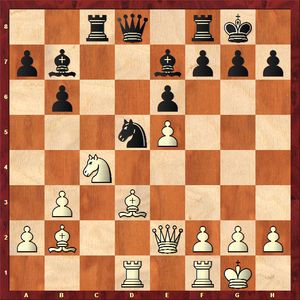
16.Nd6! Bxd6
It is risky to open up diagonals for the bishops; worthy of attention was 16…Nf4!? 17.Qe3 Nхd3 18.Nхс8 Qхс8 19.Rхd3 Ba6, winning back an exchange.
17.exd6 Qxd6?
Taking the last step into the abyss, which enables Tomilova to carry out a combination along the famous lines. However, unearthing something like 17...Nc3! 18.Bxh7+ Kxh7 19.Qd3+ Kg8 20.Bxc3 Qg5 21.g3 Qc5! is an easy nut for Alpha Zero, but by no means for those exhausted by the Yugra marathon.
18.Bxh7+! Kxh7 19.Qh5+ Kg8 20.Bxg7 Kxg7
Black is not helped out by 20...f6 21.Qg6 Nf4 22.Bxf8+ Nxg6 23.Bxd6, and White is up an exchange.
21.Qg5+ Kh7 22.Rd4
Now Black is forced to give up a queen, which marks transition into a technical stage of the game.
22…Qb4 23.Qh4+ Kg7 24.Rxb4 Nxb4 25.Qxb4, winning shortly after.
The remaining final eight game being played witnessed a real tragedy. Dina Belenkaya blundered in the opening to end up down an exchange and a couple of pawns. Then Alexandra Makarenko’s performance, devoid of resolution, had all her edge fizzled out, but she kept persisting nonetheless.
Belenkaya – Makarenko
Round 2
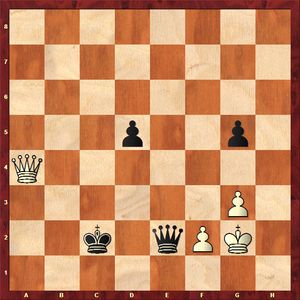
Black’s attempts to capitalize upon the passed pawns with 71...Kc3 fail as the white queen keeps the opponent’s king in a perpetual check. Even so, parting with the d5 pawn is not a good idea...
71... Kb2? 72.Qd4+ Kc2 73.Qxd5 Qe7??
Now Black is even losing, while 73...g4 would have kept the white king in prison.
74.f3 Kc3 75.Kh3 Qe2 76.Kg4 Qe7 77.Qxg5, and Dina triumphed on move 101, which was a must-win game for her opponent after the opening.
In the men’s final eight a confident victory 2:0 was scored by the rating favorite Dmitry Jakovenko over Alexandr Triapishko. Despite Alexandr ‘s fierce resistance, the home player prevailed nonetheless. Kirill Alekseenko defeated his countryman Daniil Lintchevski, and Dmitry Gordievsky, who will soon take part in the reserve Wijk aan Zee tournament, upset Dmitry Frolyanov twice through his favorite dynamic type of play. Also failing to stand the game tension against his peer David Paravyan was Maxim Chigaev. In both these matchups the losing sides obviously lacked a couple of rest days to be able to offer a full-fledged battle.
A bad blunder was committed by the Rapid Grand Prix triumphant versus a talented 15-year-old Semen Lomasov.
Lomasov – Ponkratov
Round 2
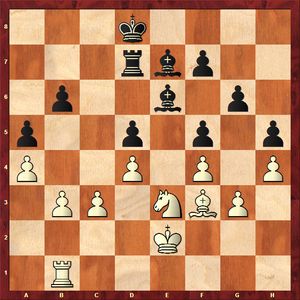
Immediately after the game Ponkratov maintained that he was holding with 52...Rd6, even though White has ideas of either carrying out b3-b4 immediately or с3-с4 later on, with only two results possible. In any case, blundering a piece was a bad idea, especially since Lomasov’s clock had not that much time after all.
52... Kc7? 53.c4 dxc4 54.d5, and Semen brought the point home. “Thank God!” “Time to go home, at last!” exclaimed Pavel when the match was over. I do hope that it was a happy end to everybody’s satisfaction.
The remaining three pairs took it into tie-breaks. However, if Boris Grachev and Saveliy Golubov did it on relatively peaceful terms, Dmitry Kokarev missed a winning opportunity in game one with Vadim Moiseenko, whereas Alexander Predke and Evgeny Shaposhnikov put up a real fight, for which we do thank them both!
Shaposhnikov – Predke
Game one
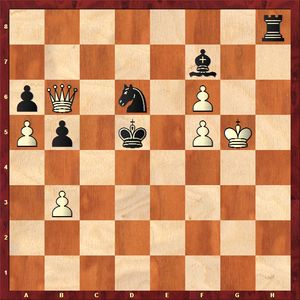
This incredible game saw a contest of a queen and passed pawns versus a rook and two minor pieces. The edge was changing hands until the diagram position, in which Shaposhnikov hurried to grab the pawn.
69.Qxa6?? Ke5
What a disaster! A checkmate is in the air after Ne4, Bh5-f3, and the king escape does not work either.
70.Kg4 Bh5+ 71.Kg3 Ne4+ 72.Kg2 Kf4! White resigns.
In the return game Evgeny opted for 1.е4 е6 2.d4 d5, which gives you ideas of trading on d5 once you are ahead in the match 1:0,. However, Sasha showed ambition by taking the opponent's piece in the old theory, but failed to hold nerves, and the score became level. Then it got worse for him, though.
Predke – Shaposhnikov
Rapid, game one
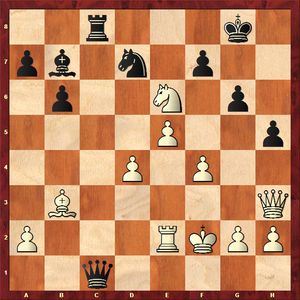
With the gladiators’ fight in full swing, not at all obvious is 30.Qe3! Qh1 31.Kg3! and White is up a pawn.
30.Qh4? Ba6 31.Nc5
Better is 31.Re1, but there is a rejoinder 31…Qd2+ 32.Kg1 fxe6 33.Bxe6+ Kf8, intending 34.Bxd7 Qxd4+.
31...Nxc5 32.Bxf7+
A last practical chance, but Shaposhnikov did not cave in and found way to avoid the perpetual.
32…Kxf7 33.Qf6+ Ke8 34.Qxg6+ Kd8 35.Qd6+ Nd7 36.e6 Qc6! – and Black went on to convert his extra piece in the endgame. The return game had Alexander willing to come back in an objectively drawn endgame at any cost, resulting in the overall score 3:1.
Dmitry Kokarev broke ahead from a tie-break with Moiseenko, but the second rapid had a blow in store for him.
Kokarev – Moiseenko
Rapid game two
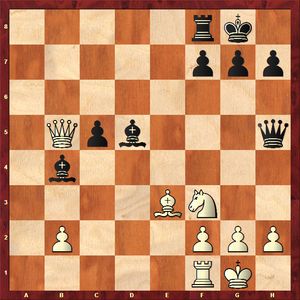
White is worse, but after 26.Ng5 the fight continues.
26.Bxc5?? Bxc5, and White resigned in view of losing a piece.
Vadim won a choice of colors in Armageddon and opted for Black, but in the "death game" the Penza grandmaster launched one of his typical Kokarev-like games. If explained in words, you should imagine yourself pressed against the wall, and a tank about to roll you over. And there is nowhere to run away from it.
Boris Grachev and Saveliy Golubov broke even in the rapid section - 1:1. While on the adjacent "Armageddon" board Kokarev was markedly ahead on time, Boris and Saveliy burned up a lot of time in a critical position out of the opening. With the opponents’ clocks displaying literally 40 seconds, the coveted mark of move 60 was still miles away.
Golubov – Grachev
Armageddon
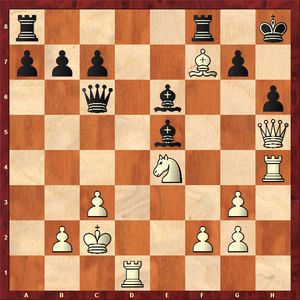
Golubov tossed in 22.Ng5? on the off chance, and instead of hanging one on the opponent with Bf5, Grachev deprived himself and the audience of a nailbiting ending featuring lightning-fast piece attacks and equally fast movements of hands pressing clock buttons...
22…Qa4+?? 23.Rxa4 Black resigns.
I do want to believe that we have successfully coped with the task of going beyond the boundaries of chessboard, and that the followup events are going to intervene with participants’ health no longer. The next cycle features the following pairings: Gordievsky - Lomasov, Jakovenko - Paravyan, Kokarev - Alekseenko and Shaposhnikov - Golubov. The Dubov-Fedoseev generation keeps pressing here as well. However, three classical players are in a serious mindset, not to mention Lomasov and Golubov.








